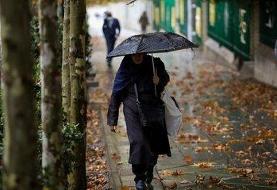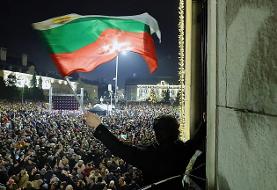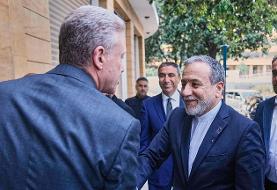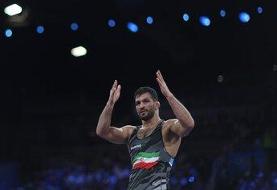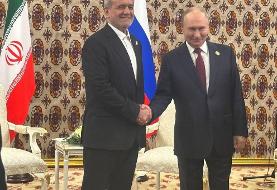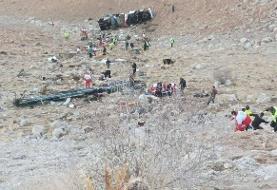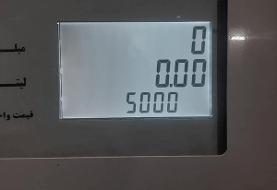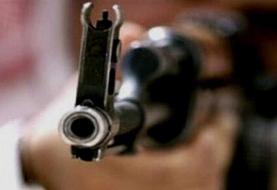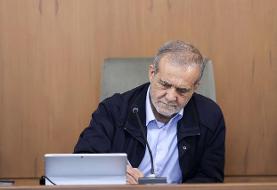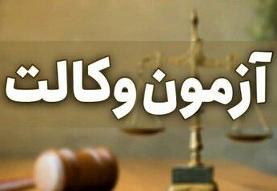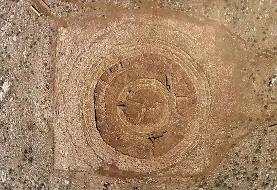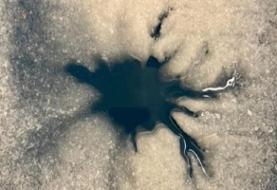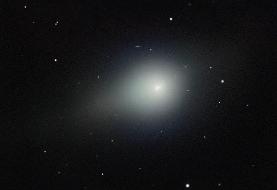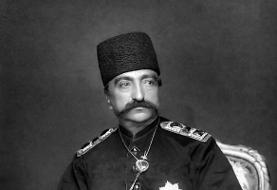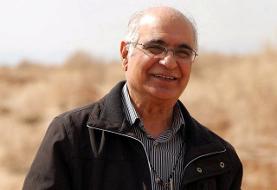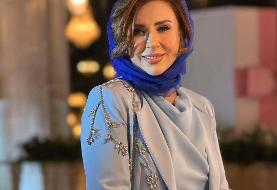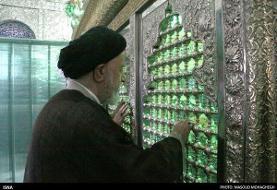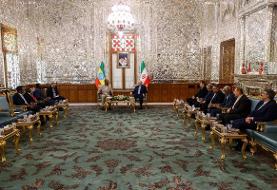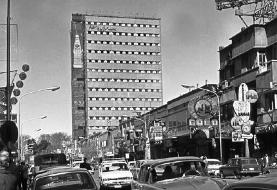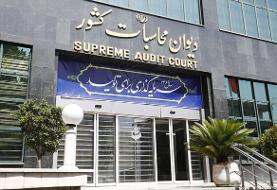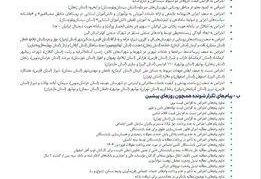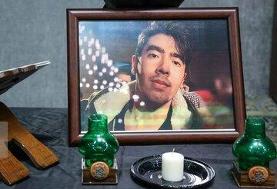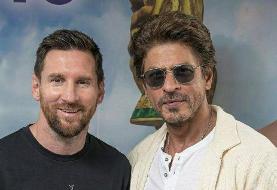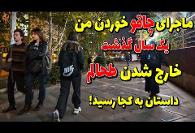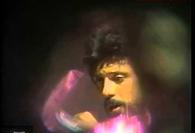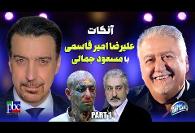محسن مخملباف
اخبار و مقالات
 جیمز باند جمهوری اسلامی، و مچ گیری او توسط امیرفرشاد ...
جیمز باند جمهوری اسلامی، و مچ گیری او توسط امیرفرشاد ...
 ویدئوی جدید طنز سیاسی سید محمد حسینی در اخطار به حکومت
ویدئوی جدید طنز سیاسی سید محمد حسینی در اخطار به حکومت
 پیام سیاسی به سبک طنز سید محمد حسینی مجری سابق صدا و سیما
پیام سیاسی به سبک طنز سید محمد حسینی مجری سابق صدا و سیما
 ویدئو: محسن مخملباف، ژولیت بینوش و بهمن قبادی در جلسه ...
ویدئو: محسن مخملباف، ژولیت بینوش و بهمن قبادی در جلسه ...
 موج خروج نیروهای اطلاعات و سپاه از کشور: محمد رضا مدحی ...
موج خروج نیروهای اطلاعات و سپاه از کشور: محمد رضا مدحی ...
 انتقاد کیهان از صدور مجوز انتشار خاطرات مخملباف ؛ چرا ...
انتقاد کیهان از صدور مجوز انتشار خاطرات مخملباف ؛ چرا ...
محسن مخملباف، (متولد ۸ خرداد ۱۳۳۶ در تهران)، نویسنده و کارگردان ایرانی است. او به عنوان یکی از تاثیرگذارترین و بحث برانگیر ترین نویسندگان و کارگردانان سینمای ایران شناخته می شود. او هم اکنون رییس آکادمی فیلم آسیایی است. فیلم های او در بسیاری از جشنواره های معتبر سینمایی نمایش داده شده و جوایز متعددی نیز کسب کرده است. مخملباف به موج جدید سینمای ایران تعلق دارد.
محسن مخملباف در جنوب شهر تهران به دنیا آمد و به دلیل فقر خانوادگی از هشت تا هفده سالگی در سیزده شغل مختلف شاگردی و کارگری کرد تا مخارج خود و مادرش را تامین کند.
او از سن پانزده سالگی در گروهی چریکی که خود تشکیل داده بود،به فعالیت سیاسی و مخفی پرداخت. در سن هفده سالگی در جریان عملیات خلع سلاح یک پلیس تیر خورد و دستگیر شد و از سال ۵۳ و به مدت چهار سال و نیم به زندان افتاد. بعد از انقلاب در حوزه هنری فعالیت کرد و کارگردانی را شروع کرد. وی فعالیت سینمایی خود را در سال ۱۳۶۰ با نوشتن فیلمنامه «توجیه» آغاز کرد. و در دهه شصت یکی از پرکارترین سینماگران بعد از انقلاب بود. در بین آثار او کمتر می توان شباهتی پیدا کرد. تنوع سلیقه و دیدگاه در یک یک فیلمهای او دیده می شوند و منتقدان هیچگاه نتوانستند شخصیت سینمایی مخملباف را بشناسند. چون او در فیلم به فیلم دیدگاهش ۱۸۰ درجه تغییر کرده است.او پدر سمیرا و حنا مخملباف (کارگردان)، میثم مخملباف (عکاس) و همسر مرضیه مشکینی (کارگردان) است. مخملباف در حال حاضر به همراه همسرش، مرضیه مشکینی (همسر سابق وی فاطمه مشکینی خواهر مرضیه بر اثر آتش سوزی در گذشت)، و فرزندانش، سمیرا، حنا و میثم، در اروپا زندگی میکند. در طی اعتراضات و تظاهرات مردمی به تقلبات در انتخابات ریاست جمهوری ۱۳۸۸ ایران مخملباف که از حامیان نزدیک میر حسین موسوی و جنبش "سبز" اصلاحات در ایران بود با دیدار با پارلمان اروپا و ایفای نقشی فعال توانست صدای معترضین داخلی را به گوش اروپاییان برساند.
آثار
کارگردانی
- فریاد مورچهها، ۱۳۸۶
- سکس و فلسفه، ۱۳۸۴
- سردتر از آتش، ۱۳۸۴
- دوشنبه بازار، ۱۳۸۳
- سفر قندهار، ۱۳۷۹
- داستانهای جزیره (اپیزود دوم، تست دموکراسی)، ۱۳۷۷
- سکوت، ۱۳۷۷
- قصههای کیش (اپیزود سوم: در)، ۱۳۷۷
- مدرسهای که باد برد، ۱۳۷۶
- گبه، ۱۳۷۴
- نون و گلدون، ۱۳۷۴
- سلام سینما، ۱۳۷۳
- هنرپیشه، ۱۳۷۱
- ناصرالدین شاه آکتور سینما، ۱۳۷۰
- شبهای زاینده رود، ۱۳۶۹
- عروسی خوبان، ۱۳۶۷
- دستفروش، ۱۳۶۵
- بایسیکل ران، ۱۳۶۴
- بایکوت، ۱۳۶۴
- استعاذه، ۱۳۶۲
- دو چشم بیسو، ۱۳۶۲
- توبهٔ نصوح، ۱۳۶۱
نویسندگی
- حراحی روح، ۱۳۶۶
- شاعر زبالهها، ۱۳۸۴
- روزی که زن شدم، ۱۳۷۹
- سفر قندهار، ۱۳۷۹
- تخته سیاه، ۱۳۷۸
- سکوت، ۱۳۷۷
- قصههای کیش (اپیزود سوم: در)، ۱۳۷۷
- مدرسهای که باد برد، ۱۳۷۶
- سیب، ۱۳۷۶
- گبه، ۱۳۷۴
- نون و گلدون، ۱۳۷۴
- سلام سینما، ۱۳۷۳
- مرد ناتمام، ۱۳۷۱
- هنرپیشه، ۱۳۷۱
- ناصرالدین شاه آکتور سینما، ۱۳۷۰
- شبهای زاینده رود، ۱۳۶۹
- فرماندار، ۱۳۶۹
- نوبت عاشقی، ۱۳۶۹
- مدرسه رجایی، ۱۳۶۸
- عروسی خوبان، ۱۳۶۷
- دستفروش، ۱۳۶۵
- بایسیکل ران، ۱۳۶۴
- بایکوت، ۱۳۶۴
- زنگها، ۱۳۶۴
- استعاذه، ۱۳۶۲
- دو چشم بیسو، ۱۳۶۲
- توبهٔ نصوح، ۱۳۶۱
- توجیه، ۱۳۶۰
- فریاد مورچهها، ۱۳۸۶

جوایز بینالمللی
- جایزه بهترین فیلم از جشنواره ریمینی، ایتالیا ۱۹۸۹، (بخاطر فیلم بایسیکل ران)
- جایزه بهترین فیلم از جشنواره فیلم هاوائی، آمریکا ۱۹۹۱، (بخاطر فیلم بایسیکل ران)
- جایزه بهترین فیلم از جشنواره تائورمینا، ایتالیا ۱۹۹۲، (بخاطر فیلم ناصرالدین شاه آکتور سینما)
- جایزه بهترین فیلم از جشنواره کارلوویواری، جمهوری چک ۱۹۹۲، (بخاطر فیلم ناصرالدین شاه آکتور سینما)
- جایزه بهترین فیلم انجمن منتقدین بین المللی فیبرشی از جشنواره کارلوویواری، جمهوری چک ۱۹۹۲، (بخاطر فیلم ناصرالدین شاه آکتور سینما)
- جایزه بهترین کارگردانی از جشنواره کارلوویواری، جمهوری چک ۱۹۹۲، (بخاطر فیلم ناصرالدین شاه آکتور سینما)
- جایزه ویژه هیئت داوران از جشنواره فیلم استانبول، ترکیه ۱۹۹۳، (بخاطر فیلم ناصرالدین شاه آکتور سینما)
- جایزه مطبوعات از جشنواره فیلم سائوپائولو، برزیل ۱۹۹۵، (بخاطر تمام آثار محسن مخملباف)
- جایزه بهترین فیلم از جشنواره فیلم مونیخ، آلمان ۱۹۹۶، (بخاطر فیلم سلام سینما)
- جایزه بهترین فیلم هنری از جشنواره فیلم توکیو، ژاپن ۱۹۹۶، (بخاطر فیلم گبه)
- جایزه بهترین کارگردانی از جشنواره فیلم سیتگس، اسپانیا ۱۹۹۶، (بخاطر گبه)۱۲- جایزه ویژه منتقدین از جشنواره فیلم سیتگس، اسپانیا ۱۹۹۶، (بخاطر گبه)
- یکی از ده فیلم برتر جهان در سال ۱۹۹۶، به انتخاب مجله تایمز، آمریکا ۱۹۹۶، (بخاطر فیلم گبه)
- جایزه بهترین فیلم بلند آسیائی از جشنواره فیلم سنگاپور، سنگاپور ۱۹۹۷، (بخاطر فیلم گبه)
- جایزه ویژه هیئت داوران از جشنواره فیلم لوکارنو، سوئیس ۱۹۹۶، (بخاطر فیلم نون و گلدون)
- جایزه طلای جوانان از جشنواره فیلم لوکارنو، سوئیس ۱۹۹۶، (بخاطر فیلم نون و گلدون)
- یکی از ده فیلم برتر دهه ۹۰ از طرف مدیران جشنوارههای جهانی، ۱۹۹۹، (بخاطر فیلم نون و گلدون)
- جایزه مدال طلا از طرف پارلمان ایتالیا از جشنواره ونیز، ایتالیا ۱۹۹۷، (بخاطر فیلم سکوت)
- جایزه انسان، هنر، طبیعت از جشنواره ونیز، ایتالیا ۱۹۹۷، (بخاطر فیلم سکوت)
- جایزه شهر ایسن دوژور، فرانسه ۱۹۹۸ (به خاطر مجموعه آثار)
- جایزه سردار هنر و ادبیات (شوالیه) فرانسه ۱۹۹۸، (بخاطر مجموعه آثار ادبی و سینمایی)
- جایزه بزرگ کلیساهای جهانی از جشنواره فیلم کن، فرانسه ۲۰۰۱، (بخاطر فیلم سفر قندهار)
- مدال طلای فدریکو فلینی از یونسکو در پاریس، فرانسه ۲۰۰۱، (بخاطر فیلم سفر قندهار)
- جایزه بهترین فیلم جشنواره آژاکسو فرانسه (بخاطر فیلم سفر قندهار) ۲۰۰۱
- جایزه «بهترین فیلم تماشاگران» از جشنواره بین المللی فیلم سینمای جنوب، فرانسه ۲۰۰۱، (بخاطر فیلم سفر قندهار)
- جایزه «بهترین کارگردانی»از جشنواره بین المللی فیلم آرسنال، لاتویا ۲۰۰۲ (بخاطر فیلم سفرقندهار)
- جایزه فرانسووا تروفو، از جشنواره جیفونی، ایتالیا ۲۰۰۲ (به خاطر مجموعه آثار)
- سفر قندهار یکی از صد فیلم برتر تاریخ سینمای جهان به انتخاب مجله تایم، آمریکا، ۲۰۰۵
- جایزه منتقدین بین المللی «فیبرشی» از جشنواره بین المللی فیلم تسالونیکی، یونان ۲۰۰۱ (بخاطر فیلم سفر قندهار)
- چهارمین دوره جشنواره مستند تسالونیکا افتخار یک عمر دستاوردهای هنری و مشارکتهای انسان دوستانه ۲۰۰۲
- جایزه «بهترین فیلم» از جشنواره بین المللی فیلم داکیومنت آرت، آلمان ۲۰۰۲ (بخاطر فیلم الفبای افغان)
- جایزه بهترین سینماگر آسیای سال ۲۰۰۳ جشنواره پوسان کره جنوبی ۲۰۰۳
بازیگری
- داستانهای جزیره (اپیزود دوم، تست دموکراسی)، ۱۳۷۷
- نون و گلدون، ۱۳۷۴
- سلام سینما، ۱۳۷۳
- کلوزآپ
Mohsen Makhmalbaf (born May 29, 1957, Tehran) is an influential and controversial Iranian film director, writer, editor, and producer. He is currently the president of the Asian Film Academy. His films have been widely presented in international film festivals in the past 10 years. The multi-award-winning director, belongs to the new wave movement of Iranian cinema.

Biography
Makhmalbaf began to support his single mother at the age of 8 and by the time he turned 17, he had worked as bellboy, plains worker and anything else he could find in the 13 jobs he went through.
A youngster in the southern districts of Tehran, Mohsen formed an under-ground Islamic militia group since he was 15 and by the time he was 17, he was shot and arrested while attempting to disarm a policeman. Expecting to remain in prison for much longer, he was released from prison shortly after the revolution in 1979. The 4½-year incarceration helped him to educate himself in various fields and reflect on life and Iranian society. This intellectual renaissance led him to distance himself from politics and in favor of literature and the arts, especially cinema. He came to believe that Iranian society suffers more from cultural poverty than anything else.
Mohsen Makhmalbaf became a writer and filmmaker in post-revolutionary Iran. His literary activities included research into the arts, novels, short stories and screenplays, some of them translated to English, French, Italian, Arabic, Urdu, Kurdish, Turkish, Korean, Portuguese, Greek, Russian, and Japanese.
He wrote and directed 18 feature films and 6 short films, as well as writing screenplays and editing films for various other Iranian filmmakers. His films screened more than 100 times at international film festivals throughout the world, and earned many awards.
In 1996 he temporarily abandoned his filmmaking career in order to teach. He formed the Makhmalbaf Film House in which he taught film to a select group of pupils including his own three children. He is currently conducting research for his upcoming film after several years of cinematic silence.
His research for the movie Kandahar included traveling secretly to Afghanistan during the Taliban rule, where he witnessed the chaotic situation of the country, becoming so disturbed that, after the completion of the film, he took charge of executing 80 projects in a 2 year period on education and hygiene within Afghanistan as well as improving the living conditions of Afghan refugees in Iran.
Many of Mohsen Makhmalbaf’s works have been censored and neglected in Iran.
Career
Mohsen Makhmalbaf is a major figure in Iranian cinema. Time magazine selected Makhmalbaf's 2001 film, Kandahar, as one of top 100 films of all time. His films have explored the relationship between the individual and a larger social and political environment. As a result, his work serves as an extended commentary on the historical progression of the Iranian state and its people. And if Makhmalbaf's films are at times polemical, he nonetheless brings a poet's sensibility to urgent and eternal issues—faith, love, regret, suffering, injustice—of the human condition.
In 1981 he wrote the screenplay for Towjeeh directed by Manuchehr Haghaniparast. In 1982 he wrote the screenplay for Marg Deegari directed by Mohamad Reza Honarmand. He made his first film Tobeh Nosuh in 1983.
Boycott is a 1985 film by Mohsen Makhmalbaf, set in pre-revolutionary Iran. The movie tells the story of a young man named Valeh (Majid Majidi) who is sentenced to death for his communist tendencies. It is widely believed that the movie is based on Makhmalbaf’s own experiences.
Mohsen Makhmalbaf creates a spare and deeply affecting portrait of human despair, exploitation, and resilience in The Cyclist (1987). The movie is about Nasim, a poor Afghan refugee in Iran, who is in desperate need of money for his ailing wife. Finally Nasim agrees to ride a bicycle in a small circle for one week straight in return for the money he needs to pay his wife’s medical bills.
Time of Love (1991) is Mohsen Makhmalbaf’s ninth feature film and the first film of what he calls his "third period". It is a romantic trilogy that offers three variations of the same story.
Makhmalbaf directed Gabbeh in 1996. The film follows the nomadic Ghashghai people, whose bright, bold carpets tell stories. The main yarn features a young woman who loves a mysterious stranger, but is forbidden to marry him. Makhmalbaf attempts to follow the carpet idea by making his film dreamily romantic and non-realistic. Events seem to leap around in time and space, much like a dream.
He has also published 27 books, many of which have already been translated in more than ten languages.
Kandahar (2001) is a fictional odyssey inspired by a true story. It is Makhmalbaf's look at Afghanistan before Sept. 11, as the Taliban's laws strip women of civil rights and hope, and a Western-cultured Afghan woman returns to prevent her sister's suicide during the last eclipse of the 20th century.
He has also taught cinema for years in his film school. His family members who studied in his school have been very successful in their career. Marziyeh Meshkini, his wife, gained thirteen international prizes for her film, The Day I Became a Woman, and his daughter Samira received the jury's prize at the Cannes film festival in 2000. His younger daughter Hana directed her first film Joy of Madness in 2003. In 2000 Boston University awarded Makhmalbaf its Special Prize.
Makhmalbaf also founded a non-governmental organization for enabling Afghan children to go to school in Iran; by means of changes in Iranian laws due to his campaigns, he succeeded in sending tens of thousands of Afghan children to schools in Iran. He also lived for a while with his family in Kabul, where he helped build schools and hospitals. He assisted an Afghan director to produce a movie and daughter Samira directed a movie in Afghanistan, entitled At Five in the Afternoon.
He is believed to currently reside in Europe. During the 2009 Presidential election in Iran, Makhmalbaf was a supporter of Mir Hossein Mousavi the "Green" reform candidate who protested the election fraud. Makhmalbaf assumed an active role and appeared before European media and the European Parliament in Brussels to represent the "Green" protest to fraud and violence in Iranian Presidential Election 2009.
Cinematic Style
Makhmalbaf focuses on several genres, from realist films to fantasy and surrealism, from minimalism to large frescos of everyday life, with a predilection (common to Iranian directors) for the themes of childhood and cinema.
Influence of Makhmalbaf on World Cinema
Persian cinema in Afghanistan is slowly on the rise, after a long period of silence. Before the September 11 attacks, Makhmalbaf attracted global attention to Afghanistan with his celebrated movie, Kandahar. Kandahar was an attempt to tell the world about a forgotten country. Later on, Yassamin Maleknasr, Abolfazl Jalili, Samira Makhmalbaf and Siddiq Barmak made significant contributions to Persian cinema in Afghanistan. Siddiq Barmak is also director of the Afghan Children Education Movement (ACEM), an association that promotes literacy, culture and the arts, founded by Makhmalbaf. The school trains actors and directors for the emerging Afghan cinema.
In Tajikistan, Makhmalbaf is playing the same role as he played in the reconstruction of the cinema of post-Taliban Afghanistan. 1st Didar Film Festival, the first Film festival in Tajikistan, was held in 2004.
Filmography (Written and Directed by Makhmalbaf)
- Boycott (1985)
- The Street Vendor (1986)
- The Bicyclist (1987)
- The Marriage of the Blessed (1988)
- Time of Love (1990)
- The Nights of Zayande-rood (1990)
- Naser-ed-din Shah (1991)
- Actor (1993)
- Hello Cinema (1994)
- Gabbeh* (1995)
- Bread and Flower-pot (retitled Moment of Innocence for anglophone audiences) (1995)
- The Silence (1997)
- Test of Democracy (1999), with Farrokh-yar
- Kandahar (2001), brought him the Federico Fellini Prize From Unesco in Paris in 2001
- Alefbay-e afghan (2002) (The Afghan Alphabet, documentary)
- Monday Market (2004)
- Colder Than Fire (2005)
- Sex & Philosophy (2005)
- Chair (2005)
- Poet of wastes (2005)
- Scream of the ants (2006)
Film Appearances (Playing Himself)
- The Marriage of the Blessed (1988), directed by himself
- Close-up (1988), directed by Abbas Kiarostami
- Hello Cinema (1994), directed by himself
- Bread and Flower-pot (1995), directed by himself
- The Test of Democracy (1999), directed by himself and Farrokh-yar

Member of Jury
- Venice film festival (2006)
Lifelong Achievement Awards
- Scythian Deer, from the President of Ukraine (2007)
- President of Asian Film Academy (2007)
- Parajanov Award for outstanding Artistic contribution to the world cinema (2006)
- Federico Fellini Gold Medal, UNESCO (2001)
Books on Makhmalbaf
- Hamid Dabashi, Close Up: Iranian Cinema, Past, Present and Future. (Chapter on Makhmalbaf). Verso, 2001.
- Hamid Dabashi, Like Light from the Heart of Darkness. Sakuhinsha, Japan, 2004.
- Hamid Dabashi, Masters & Masterpieces of Iranian Cinema: (Chapter XI: Mohsen Makhmalbaf: A Moment of Innocence. pp. 325-368). Mage Publishers, 2007. ISBN 093421185X.
- Hamid Dabashi, Makhmalbaf at Large: The Making of a Rebel Filmmaker. I. B. Tauris, 2007.
- Introducing of Mohsen Makhmalbaf and His Works.
- The films of Makhmalbaf.
- Mohsen Makhmalbaf.
- Makhmalbaf's Broken Mirrors.
Films About Makhmalbaf
- The Closed Eyes of Mohsen
- Close up, by Abbas Kiarostami, 1990
- Friendly Persuasion : Iranian Cinema After the Revolution
- Cinema Is Nation's Language
- The Dumb Man's Dream
- Who's Who?











